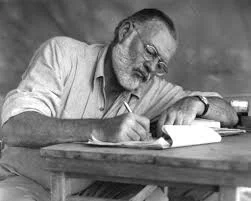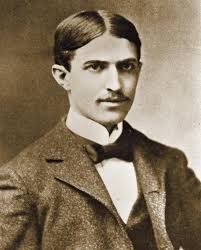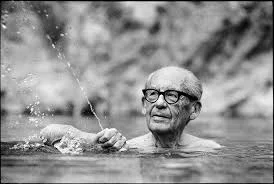Care to be a Successful Writer? Perhaps you should ask Hemingway.
I have always been told that to be a writer one has to be a reader. A serious reader! Alternatively, one should at least try to spend a little time with a writer of note which really means one whose books are widely read. Love him or hate him, Hemingway was a serious, disciplined and inspiring writer and I can only hope to emulate his dedication to his craft. ( This might mean shrugging off my addiction to sloth !)
It was wonderful therefore to come across Arnold Samuelson’s intriguing novel, ‘With Hemingway. A year in Key West and Cuba.’
The unpublished manuscript only came to light after his daughter discovered it among his processions after his death in 1981 and thankfully it is now in print.
From here on in, I’ll let Mr.Samuelson tell the story;
In 1934, a 22-year-old aspiring writer named Arnold Samuelson set out to meet his literary hero, hoping to steal a few moments with Hemingway to talk about writing. Just having completed his coursework in journalism at the University of Minnesota, this son of Norwegian immigrant wheat farmers, refused to pay the $5 diploma fee conveyed on him by the university he made a bold decision.
Convinced that his literary education would be best served by apprenticing himself to one of the ‘best’ writers of the time, Ernest Hemingway, he climbed aboard a coal car in Minnesota and ‘road the rails’ all the way to Key West. “It seemed a damn fool thing to do,” Samuelson later recalled, “but a twenty-two-year-old tramp during the Great Depression didn’t have to have much reason for what he did.” Unreasonable though the quest may have been, he ended up staying with Hemingway for almost an entire year, over the course of which he became the literary titan’s only true protégé.
Samuelson recorded the experience and its multitude of learnings in a manuscript that was only discovered by his daughter after his death in 1981. It was eventually published as With Hemingway: A Year in Key West and Cuba — the closest thing to a psychological profile of the great writer.
Shortly after the young man’s arrival in Key West, Hemingway got right down to granting him what he had travelled there seeking. In one of their first exchanges, he hands Samuelson a handwritten list and instructs him:
Here’s a list of books any writer should have read as a part of his education… If you haven’t read these, you just aren’t educated. They represent different types of writing. Some may bore you, others might inspire you and others are so beautifully written they’ll make you feel it’s hopeless for you to try to write.
This is the list of heartening and hopeless-making masterworks that Hemingway handed to young Samuelson:
1. The Blue Hotel by Stephen Crane
2. The Open Boat by Stephen Crane
3. Madame Bovary by Gustave Flaubert
4. Dubliners by James Joyce
5. The Red and the Black by Stendhal
6. Of Human Bondage by W. Somerset Maugham
7. Anna Karenina by Leo Tolstoy
8. War and Peace by Leo Tolstoy
9. Buddenbrooks by Thomas Mann
10. Hail and Farewell ) by George Moore
11. The Brothers Karamazov by Fyodor Dostoyevsky
e e cummings
13. The Enormous Room by E.E. Cummings
14. Wuthering Heights by Emily Brontë
15. Far Away and Long Ago by W.H. Hudson
16. The American by Henry James
Alongside the list of heavy tomes, Hemingway offered young Samuelson some concrete writing advice. He advocated what psychologists now call Flow, or as he put it, “staying with the script” He went on to explain the psychological discipline of the writing process:
“The most important thing I’ve learned about writing is never to write too much at a time… Never pump yourself dry. Leave a little for the next day. The main thing is to know when to stop. Don’t wait till you’ve written yourself out. When you’re still going good and you come to an interesting place and you know what’s going to happen next, that’s the time to stop. Then leave it alone and don’t think about it; let your subconscious mind do the work.”
Gustav Flaubert
He continues;
“The next morning, when you’ve had a good sleep and you’re feeling fresh, rewrite what you wrote the day before. When you come to the interesting place and you know what is going to happen next, go on from there and stop at another high point of interest. That way, when you get through, your stuff is full of interesting places and when you write a novel you never get stuck and you make it interesting as you go along. Every day go back to the beginning and rewrite the whole thing and when it gets too long, read at least two or three chapters before you start to write and at least once a week go back to the start.
Ernest Hemingway
That way you make it one piece. And when you go over it, cut out everything you can. The main thing is to know what to leave out. The way you tell whether you’re going good is by what you can throw away. If you can throw away stuff that would make a high point of interest in somebody else’s story, you know you’re going good.”
Later to say he imparted some wise words to the eager Samuelson;
“Sometimes you can go on writing for years before it shows. If a man’s got it in him, it will come out sometime. The only thing I can advise you is to keep on writing but it’s a damned tough racket. The only reason I make any money at it is I’m a sort of literary pirate. Out of every ten stories I write, only one is any good and I throw the other nine away”.
Hemingway tempers this with a word of advice on ambition, self-comparison, and originality:“Never compete with living writers. You don’t know whether they’re good or not. Compete with the dead ones you know are good. Then when you can pass them up you know you’re going good. You should have read all the good stuff so that you know what has been done because if you have a story as one somebody else has written, yours isn’t any good unless you can write a better one.
Stephen Crane
In any art, you’re allowed to steal anything if you can make it better, but the tendency should always be upward instead of down. And don’t ever imitate anybody. All style is, is the awkwardness of a writer in stating a fact. If you have a way of your own, you are fortunate, but if you try to write like somebody else, you’ll have the awkwardness of the other writer as well as your own.”
Makes sense really wouldn’t you say?













